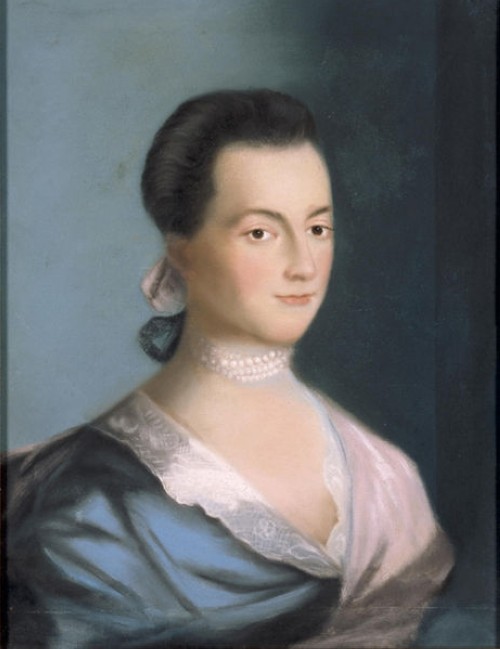Abigail Adams was one of our country’s greatest silent heroes. She went through war, pain, hardship, disease, and much more for the sake of the country she loved so much.
Abigal Smith was born in Weymouth, Massachusetts, to Reverend William Smith and Elizabeth Quincy Smith. When she was young she did not receive a proper education due to her poor health, but she and her sisters had access to their father’s library where they learned literature and their mother taught them from home. This is how she did most of her learning.
She had known her third cousin John her whole life. Although her mother originally opposed her marriage to the country lawyer, she gave in and Abigail Smith married John Adams, future president of the United States. She moved with him to Braintree before the family moved to Boston where his law practice flourished. They had six children, one of them stillborn. One of these was John Quincy Adams who would follow his father’s political journey and became America’s sixth president.
Much of Abigail Adams’ marriage was spent at home while her husband was traveling, during which time they exchanged letters. Over their marriage, over 1,000 letters were exchanged. (Given the postal system at the time, this was extraordinary.) He served as an ambassador for the United States in Paris and London and he attended the Continental Congress. While her husband was gone, the Continental army was camped practically in Abigail’s front yard. She and her children did what they could to care for the soldiers.
Abigail and her daughter Nabby joined John and John Quincy in Paris. Abigail was shocked at the low-cut, revealing, “scandalous” styles of the French and was very homesick for Massachusetts during this period.

When the small pox epidemic came through she had a doctor give her and her children a vaccine, which in their day was severing a bit of skin, inserting some of the pus from the pox, and tying a bandage around it. This was not always the safest thing to do, but it was safer than not being immune and living with close to three hundred who all have the disease.
This went well for all except her oldest daughter, who came down with the disease so badly that they wondered if she would make it. This disease caused large pus-filled boils all over her body, and gave her a very high fever, which left her shivering in bed night and day. In spite of how badly she contracted the disease, she recovered, but not without scars from the pox marring her skin.
Along with her good friend Mercy Warren and the governor’s wife Hannah Winthrop, Abigail Adams was appointed by the Massachusetts Colony General court to question other Massachusetts women and discover whether they were loyal Patriots or Tories. Abigail was interested in politics and her husband John asked her advice many times before, during, and after his presidency. She was known by some as “Mrs. President” because of her strong political activities.
Abigail Adams, Munitions Manufacturer
When the British fired on Boston’s harbor and left the continental army with nothing to defend themselves with, Abigail could see it from the window of her house. She could feel the vibrations from the cannons as she held her children close and hoped that what she told them was true—it would all be fine in the end.
Soon after the devastating event, a few officials from the army finally received what they had been requesting for so long: weapons. Unfortunately, although they received muskets, they were dismayed to discover they did not come with bullets or gun powder; they were still defenseless.
Abigail Adams came to the rescue. She went home immediately, gathered all the silver and steel in the house, melted it down, and, with the help of her children, made bullets for the army. After seeing the bravery of this young mother the army was heartened for the first time in a long while. This beautiful act of loyalty gave inspiration to some of the authorities in the army. They heroically took up arms, went to one of the British bases, and stole gun powder and three large cannons.
Political Life
During the second Continental Congress, she wrote to John suggesting that the beginning of a new government was the perfect opportunity to begin pushing for women’s rights being equal with men’s. This didn’t happen in her lifetime, but she is one of the earliest known women’s rights activists.
She was a close friend to Thomas Jefferson and they corresponded regularly, though when he ran against John Adams for the post as President, they had a falling out and she stopped writing him for a while. She had difficulty, as First Lady, in keeping her opinions to herself. Being used to writing and saying exactly as she thought, she struggled with the composure and civility that were required in an important political position. She wrote, “I have been so used to freedom of sentiment that I know not how to place so many guards about me, as will be indispensable, to look at every word before I utter it, and to impose a silence upon myself, when I long to talk.”
John Adams was a member of the Republican party as was his close friend Thomas Jefferson. On meeting their opponent Alexander Hamilton, the leader of the Federalist Party, Abigail Adams announced that she had “just looked into the eyes of the devil himself.” She felt he threatened her husband’s political beliefs and so her strong opposition is, perhaps, forgivable.
Thomas Jefferson won the next election in 1801, John and Abigail Adams retired from the political world, although Abigail took a strong interest in her son John Quincy Adams’ rise to the presidency. She died in October 1818, following her daughter Nabby who died of breast cancer just a few years before.


